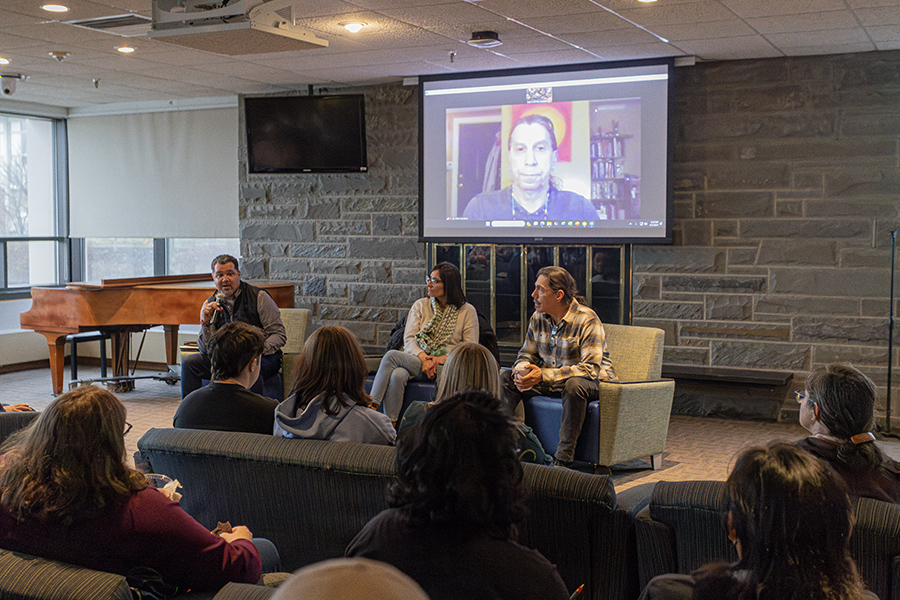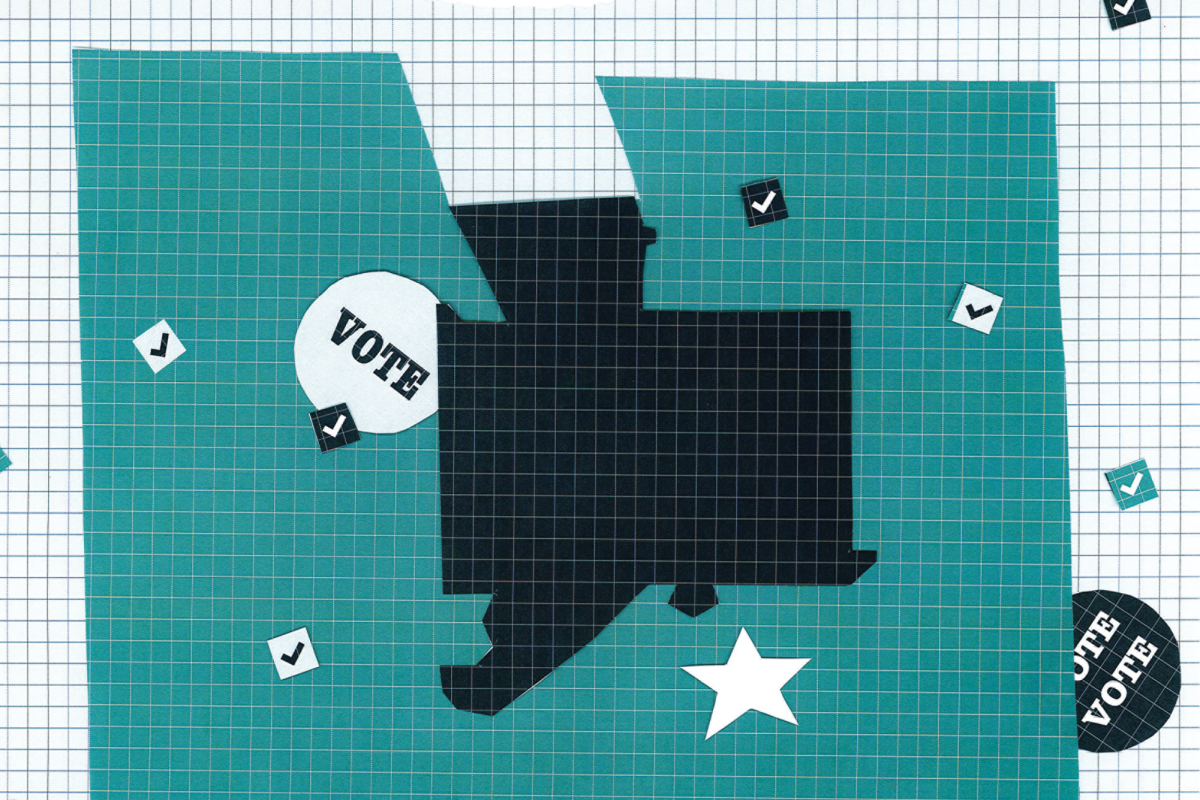Ithaca College’s Center for the Study of Culture, Race, and Ethnicity (CSCRE) organized a Discussion Series event April 3 with members of the Gayogo̱ hó:nǫˀ Learning Project for the first time since Spring 2023. About 60 people attended the discussion in Clark Lounge and learned about the importance of meaningful partnership, language preservation and decolonization through first-hand experiences of Gayogo̱ hó:nǫˀ people.
The Gayogo̱ hó:nǫˀ Learning Project is a local group of people who promote awareness about the Gayogo̱ hó:nǫˀ language, guided by the principle of peaceful coexistence and reconnection with Indigenous culture.
Sean Eversley Bradwell, assistant professor in the Department of Education and chair of CSCRE, moderated the discussion and engaged with three members of the Gayogo̱ hó:nǫˀ Learning Project: Advisory Board Member Jim Wikel; Michelle Seneca, outreach and engagement lead; and Stephen Henhawk, language and culture lead.
Henhawk, who is a language teacher at the Gayogo̱ hó:nǫˀ Learning Project, said language is something that gives him a new lens and perspective that is different from how he would usually think.
“I teach language because when you take a language away from a population you … change their train of thought. … I don’t think English, I think Gayogo̱ hó:nǫˀ, my thoughts are in Gayogo̱ hó:nǫˀ,” Henhawk said.
Bradwell said CSCRE decided to organize a discussion session with members of the Gayogo̱ hó:nǫˀ community to develop meaningful relationships with them especially because the college is on the ancestral land of the Cayuga people and Haudenosaunee Confederacy.
“I along with some other folks have been a part of a committee that was asked by the college to write a land acknowledgment statement,” Bradwell said. “[But] it wasn’t working for us. It seemed disconnected. … We realized quite quickly if we were going to do something, we need to … actually spend some time to get to know each other and develop relationships.”
Seneca said the Gayogo̱ hó:nǫˀ community has a traumatic past of being forcefully removed from their land, which is why coexistence is the way forward. She said she hopes that the work of the Gayogo̱ hó:nǫˀ Learning Project is a step in that direction.
“We’re a really super young organization,” Seneca said. “And I want to slow down a little … just keep these relationships … so we can remember where we started and then keep [things] alive.”
All three speakers emphasized the importance of preserving indigenous culture throughout their discussion. Wikel said that connecting with his culture was a key component in his recovery from addiction.
About one in five Native American young adults have a substance use disorder. Wikel said addiction is common among Native American individuals because they might turn to substances when they feel disconnected from their roots.
“A large part of my addiction and a large part of addiction with native people is that we’re lost, we’re cut off,” Wikel said. “And somehow we might find some false sense of connection and power in drugs or alcohol or violence, however it manifests.”
Wikel said he is mixed, meaning his mother was from the Seneca Cayuga Nation in Oklahoma and his father was not Native American. He said he thinks his mother did not expose him to their culture because she was a survivor of an Indian boarding school and carried that trauma with her.
“[I was] not raised with any knowledge of who we were, where we came from, other than the fact that when we would go back to visit my grandmother … and a card in my wallet that said, I had a degree of Indian blood,” Wikel said.
These boarding schools were government or church-run schools prevalent in the late 19th century that culturally oppressed Native Americans. The schools prohibited Native American students from wearing traditional clothes, speaking their language and sometimes seeing their parents for long periods.
In 2010, then-President Barack Obama signed an official apology to Native Americans and all the institutionalized injustices that took place against them. Seneca said she was among the first 10 Native American families to return to Cayuga Lake in 2010.
“When I say coexist, this is where I’m actually putting my social justice that I’ve learned through repatriating my own self back into the ecosystem that I was forcibly removed from,” Seneca said. “The land wants us back, too. It wants us as much as we want it.”
First-year student Yusef Scott-Wetherbee attended the discussion because he wanted to and was also encouraged to go to it for his Intro to Native American and Indigenous Studies class. He said he was very impressed by the turnout.
“Every student of color usually comes to these events,” Scott-Wetherbee said. “And I think it’s awesome when we see our white peers show up to these events when they don’t have to, and I would like to see that more reflected in the community.”
Scott-Wetherbee said he also liked the way the discussion was moderated by facilitators who invited people from the Gayogo̱ hó:nǫˀ community to share their experiences.
“I thought that the talk was better constructed than other events that they’ve done on people of color populations, but especially [on] Indigenous peoples by focusing their voices instead of having white professors whose expertise is in ethnic studies [or something like that],” Scott-Wetherbee said.
Henhawk said he was grateful for engaging in this discussion and mentioned that even though many people call him a historian, he prefers not to be labeled as one because the stories of Indigenous people do not exist only in the past.
“My work is to ensure that our people, our people are present today,” Henhawk said. “[And] we have got to have a presence tomorrow [as well]. There’s got to be a future.”














